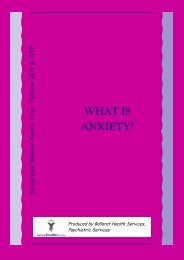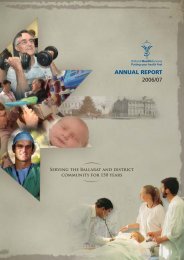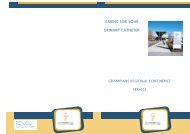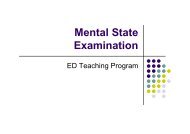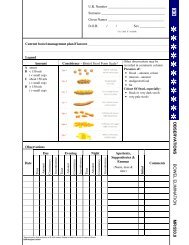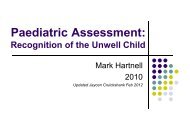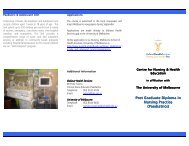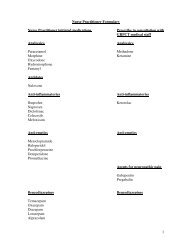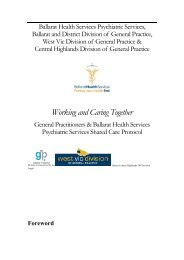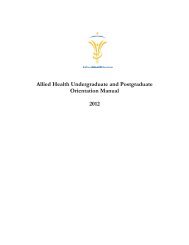Waiting for surgery<strong>Ballarat</strong> <strong>Health</strong> <strong>Services</strong> has sixoperating theatres and two procedurerooms, performed 10,443 operationsduring 2007-2008. Elective cases areperformed between 8am – 6pmMonday to Friday, with emergencycases performed as required, day ornight.As per DHS Elective Surgery Guidelines<strong>Ballarat</strong> <strong>Health</strong> <strong>Services</strong> endeavors totreat patients waiting for electivesurgery in a timely manner, Category 1patients within 30 days, Category 2patients within 90 days and Category 3within 365 days. This may not alwaysbe possible to achieve given thevolume and complexity <strong>of</strong> patientswaiting for elective surgery, particularlyin the specialties <strong>of</strong> orthopaedics andophthalmology.The number <strong>of</strong> complex Category 1elective patients waiting for surgery hasgrown significantly over the last fouryears, <strong>of</strong>ten resulting in those patientsin categories 2 or 3 experiencing delaysand sometimes cancellations. BHS hasmaintained the 100 per cent targetthat ensures that the most urgentpatients (Category 1) undergo surgerywithin the 30 days.BHS treats the most urgent emergencypatients first; sometimes this meansthat elective surgery is cancelled, andpeople with less serious conditionspresenting in the EmergencyDepartment must wait. BHS isconstantly reviewing the number andtypes <strong>of</strong> patients waiting for surgery toensure equitable access for all patientsand to this end conducts 6 monthlyaudits <strong>of</strong> the elective surgery waitinglist.<strong>Ballarat</strong> <strong>Health</strong> <strong>Services</strong> reported 84.30per cent category 3 patients waiting365 days or less for surgery, thereforenon-achievement <strong>of</strong> the Department <strong>of</strong><strong>Health</strong> <strong>Services</strong> (DHS) waiting listtarget. The increased emergencypresentations put extreme pressure onelective surgery patients <strong>of</strong>ten resultingin cancellation <strong>of</strong> category 2 or 3surgery and impacting on hospitalresources and the management <strong>of</strong> thewaiting list. The DHS program, ElectiveSurgery Access Service (ESAS) a statewide program, to assist patients onlong waiting lists saw 28 <strong>of</strong> ourpatients receive their care earlier thanwould be possible at BHS to the end <strong>of</strong>June 2008. If you are a patientsaccepting treatment through ESAS youmust be willing and able to attendoutpatient, pre-admission and postoperativeappointments at thedesignated hospital. The initial referral2004/05 2005/06 2006/07 2007/08 TargetCategory 1: Urgent Admission 100.00% 100.00% 100.00% 100.00% 100%Within 30 days desirable for a conditionthat has the potential to deterioratequickly to the point it may becomean emergencyCategory 2: Semi-Urgent Admission 87% 78% 96% 88.54% 88%Within 90 days desirable for a conditioncausing some pain, dysfunction ordisability but is not likely to deterioratequickly or become an emergencyCategory 3: Non-Urgent AdmissionAt some stage in the future acceptable N/A 92% 83% 84.30% 93%for a condition causing minimal or nopain, dysfunction or disability that isunlikely to deteriorate quickly, and doesnot have the potential to becomean emergencyNumber <strong>of</strong> patients on the Elective 1009 1239 1140 1,017 1,046Surgery Waiting Listis arranged by the ESAS Coordinator at<strong>Ballarat</strong> <strong>Health</strong> <strong>Services</strong>. The receivinghospital then communicates with bothyou and your General Practitionerregarding the surgery and care. Youwill also have access to a designatednurse at BHS regarding any enquiries orissues.For further information please contactthe elective surgery coordinator on(03) 5320 4775.Outpatient <strong>Services</strong>The <strong>Ballarat</strong> <strong>Health</strong> <strong>Services</strong> OutpatientService is committed to the delivery <strong>of</strong>a coordinated, flexible and high qualityOutpatients Service, responsive to youthe consumer.BHS has been investigating Outpatientwaiting times over the last year tomake sure the most urgentappointments are seen within anacceptable timeframe.The Outpatients Department hasimplemented an electronic waiting listwhich allows a current list <strong>of</strong> patientswaiting for an appointment.Each clinical specialty has an individualwaiting list with nursing staff assignedto contact long waiting patients bytelephone to provide assurance, clinicaladvice and if necessary anappointment. This phone call allowsthe staff to update demographicsdetails, remove the patient from the listif the appointment is no longerrequired and gives the patient anindication <strong>of</strong> waiting time.Outpatient visits exceeded 2007-2008target by 977 or 2.46 per cent.<strong>Ballarat</strong> <strong>Health</strong> <strong>Services</strong> had 36,694outpatients visits during the financialyear.<strong>Ballarat</strong> <strong>Health</strong> <strong>Services</strong> has asignificant number <strong>of</strong> outpatient’sappointments that are not kept – didnot attend (DNA). Significant resourcesare used in the management <strong>of</strong>patients that do not attend. A jointinitiative between BHS and the <strong>Ballarat</strong>and District Aboriginal Co-operative(BADAC) has been embraced by ourindigenous residents resulting in asubstantial decline in the failure rate <strong>of</strong>Aboriginals attending outpatientappointments.The proportion who now fail to attendtheir appointments has fallen to 21 percent, compared with a failure rate <strong>of</strong>40 per cent prior to the introduction <strong>of</strong>the program. Under the program BHSnow notifies BADAC, when makingoutpatient appointments forindigenous clients. BADAC staff arethen responsible for contacting theclient in the lead-up to theappointment and organizing transportand support if required.21<strong>Ballarat</strong> <strong>Health</strong> <strong>Services</strong> <strong>Quality</strong> <strong>of</strong> <strong>Care</strong> <strong>Report</strong> 2007-08
HARPThe Hospital Admission Risk Program(HARP) at <strong>Ballarat</strong> <strong>Health</strong> <strong>Services</strong> is aDHS funded program that usespreventative models <strong>of</strong> care in order toimprove the health <strong>of</strong> peopleexperiencing chronic and complexhealth conditions.HARP aims to achieve this throughtargeting clients who are identified asfrequent hospital attendees or at risk <strong>of</strong>hospitalisation, and who would mostlikely benefit from integrated andcoordinated care provided by the HARP<strong>Care</strong> Coordinators.All <strong>of</strong> the HARP clients on the chronicdisease streams have care plans.<strong>Services</strong> include:• Providing better services, informationand advocacy to clients and theirfamilies.• Ensuring that clients are treatedquickly at the earliest signs <strong>of</strong> changein their condition.• Provision <strong>of</strong> ongoing support andmonitoring for clients betweenhospital admissions.• Improved communication betweenthe client, hospital, GP andcommunity agencies.• Referral and linking <strong>of</strong> clients withappropriate services.• Incorporating the principles <strong>of</strong> selfmanagement into the overall aims <strong>of</strong>the program.HARP currently <strong>of</strong>fers services for thefollowing groups:• People with chronic heart disease;• People with chronic respiratorydisease;• People with Diabetes;• Older people with complex needs(Falls);• People with complex psychosocialneeds; and• Currently HARP has a total <strong>of</strong>115 clients.The following client story reflects thelevel <strong>of</strong> service coordination,integration and support required toassist consumers in navigating theirway to better health outcomes.Linda Govan (left), HARP Manager with HARP staff Diane Lawson, Carmel Cunnington,Karen Brodie and Nola PoulterYour ExperiencePatient StoryThe client is a 67 year old male, with a history <strong>of</strong> Type 2 diabetes and heartdisease, who presented to the Emergency Department at BHS, after collapsingdue to low blood sugar (hypoglycaemia). The client also struggled with anxiety,related to living alone on an isolated property outside <strong>Ballarat</strong>, had limitedfamily support, and a fear <strong>of</strong> experiencing further hypoglycaemic events.English is also a second language for the client.Assessment occurred at the client’s home by the HARP <strong>Care</strong> Coordinator andindicated that the client did not have a GP in <strong>Ballarat</strong>, was not monitoring hisblood glucose levels and required podiatry and ophthalmology reviews.Outcomes:The HARP <strong>Care</strong> Coordinator organised the following services for the client:• Linked in with GP services at <strong>Ballarat</strong> Community <strong>Health</strong> Centre,Sebastopol;• Referral to Podiatry, Dietetics and Ophthalmology;• Referral to the National Diabetes Service Scheme (NDSS);• Purchase <strong>of</strong> a glucometer, with support and education initially providedby <strong>Ballarat</strong> District Nursing and Healhcare, funded through Post Acute <strong>Care</strong>at BHS;• Other support services organised included home help, shoppingassistance and Safety Link; and• The client was reviewed by Dr Andrew Kemp for HARP, with follow upprovided at the Diabetes Clinic at the Queen Elizabeth Centre.Concurrently, the HARP <strong>Care</strong> Coordinator also provided support with selfmanagement strategies, related to blood glucose monitoring, development <strong>of</strong>an Action Plan with the client to assist with “sick day” management,assistance with medication adherence through improving symptommanagement and understanding, and reinforcement <strong>of</strong> dietary advice.Through involvement with HARP, the client now has regular contact with hisgeneral practitioner, is gaining confidence in symptom recognition andmanagement, has shown improved medication adherence and is generallymore confident in navigating his way through the health care service system.<strong>Ballarat</strong> <strong>Health</strong> <strong>Services</strong> <strong>Quality</strong> <strong>of</strong> <strong>Care</strong> <strong>Report</strong> 2007-08 22



